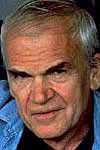The page of Kundera, Milan, English biography
Biography
Milan Kundera (born April 1, 1929 in Brno, Czechoslovakia) is a Franco-Czech writer.Kundera has lived in France since 1975, and has been a French citizen since 1981. He was born into the highly cultured middle class family of Ludvík Kundera (1891-1971), a pupil of the composer Leoš Janáček and an important Czech musicologist and pianist, the head of the Brno Musical Academy between 1948 and 1961. From early years on, Kundera learnt to play the piano with his father. Later, he also studied musicology. Musicological influences can be found throughout Milan Kundera's work.
The author completed his secondary school studies in Brno in 1948. He then started studying literature and aesthetics at the Faculty of Arts at Charles University, but after two terms he transferred to the Film Academy, where he first attended lectures in film direction and then in script writing. In 1950, he was temporarily forced to interrupt his studies for political reasons. After graduation in 1952 he was appointed as lecturer in world literature at the Film Academy. Kundera belonged to the generation of young Czechs who had not properly experienced the pre-war democratic Czechoslovak Republic. Their growing up was greatly influenced by the experiences of the Second World War and the German occupation. The experience of German totalitarianism instilled in these young people a somewhat black-and-white vision of reality. It propelled them towards Marxism and membership of the Communist Party. Milan Kundera joined the ruling Czechoslovak Communist Party in 1948, still in his teens. In 1950 he and another Czech writer, Jan Trefulka, were expelled from the party for "anti-party activities". Trefulka described the incident in his novella Pršelo jim štěstí (Happiness rained on them, 1962), Kundera used the incident as an inspiration for the main theme of his novel Žert (The Joke, 1967). Milan Kundera was re-admitted into the Communist Party in 1956. In 1970, he was expelled from the Party for the second time. Kundera, along with other Czech artists and writers such as Václav Havel, was involved in the 1968 Prague Spring, the brief period of reformist optimism that was eventually crushed by pro-Soviet forces.
In his first book, The Joke, he gave a satirical account of the nature of totalitarianism in the Communist era. Because of his criticism of the Soviets and their 1968 invasion of his homeland, Kundera was black-listed and his works were banned shortly after the Soviet invasion. In 1975, Kundera fled to France. There he wrote The Book of Laughter and Forgetting, (1979) which told of Czech citizens opposing the Soviet regime in various ways. A strange mixture of a novel, a short story collection and a group of the author's musings, the book set the tone for his post-exile works.
In 1984, he released The Unbearable Lightness of Being, which is his most popular work. The book chronicled the life of a Czech couple's difficulties adjusting to life with each other and to the Soviet occupation. In 1988, American director Philip Kaufman released a moderately successful film version of the novel. In 1990, Kundera released Immortality. The novel was more cosmopolitan than his others with a more explicit philosophical (and less political) content and would set the tone for his later novels.
Kundera has repeatedly insisted that he be considered a novelist in general rather than a political or dissident writer; political commentary has all but disappeared from his novels (starting specifically from The Book of Laughter and Forgetting) except in relation to broader philosophical themes. Kundera's style of fiction, interlaced with philosophical digression, greatly inspired by Musil's novels and Nietzsche's prose, is also used by authors Alain de Botton and Adam Thirlwell. Kundera takes his inspiration, as he underlines often enough, not only from the Renaissance of Boccaccio and Rabelais, but also from Sterne, Diderot, Musil, Gombrowicz, Broch, Kafka and Heidegger.
Milan Kundera uses a technique called psychological realism in order to describe his characters. He's more concerned in the thought processes of his characters than their physical appearances. He believes that the reader's imagination automatically completes the writer's.
In 1985 Kundera received the Jerusalem Prize. His acceptance address is printed in his essay collection The Art of the Novel.
http://en.wikipedia.org/




